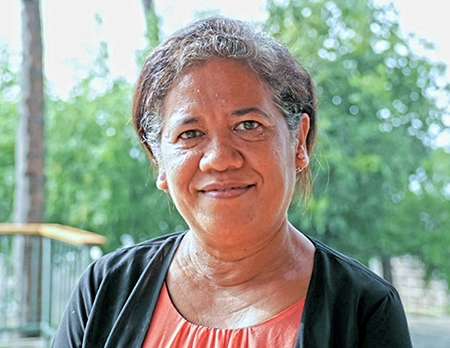Bringing Gender Equality One Step Closer Through the Municipality Law in Timor-Leste
Date:
Author: Eunjin Jeong

“This is a critical time for us to really focus on integrating gender aspects in the laws at the municipal level” said Laura Pina, founder of Fundação Pátria, on the second day of the debate on Local Power and Municipal Electoral Laws in Liquica, the municipality neighboring Timor-Leste’s capital of Dili. “Members of Parliament will analyze each article of those two laws and will make a proposal for the first time to pass them in the National Parliament,” she continued in excitement.
The discussions that will cover the inclusion of gender provisions in the laws are a milestone and a reflection of the consistent advocacy Laura and other gender advocates have worked hard to make visible since 2009.
Under Laura’s leadership, NGO Fundação Pátria, a local organization working on women’s participation in politics, has been actively lobbying the Government to integrate gender equality measures in the process of decentralization. The organization’s three key demands are for municipalities to have clear responsibility to promote gender equality; higher representation of women in local decision-making structures; and institutionalized gender-responsive budgeting in municipalities. UN Women has been one of several organizations supporting Laura’s dream to make positive changes in the lives of Timorese women since 2013, providing tools and facilitating joint gender analysis of draft legislation, among other support, through its gender mainstreaming programme, generously funded by the Norwegian government.
Laura has a strong belief that women need more support to transform their situation and decentralization is one of the key methods to achieve women’s empowerment. “Bureaucracy has been a significant obstacle for local women to receive basic services and have their voices heard,” Laura said when asked how decentralization can boost gender equality. “Women work long hours, and they have many responsibilities in the household, which does not allow them to easily participate in the political arena. When decision-makers are closer to people, women can have easier access to them,” she added. While women have a high level of representation at the national level, both in the National Parliament (37 per cent) and in the Government (21 per cent), there are currently no woman leading the thirteen Municipalities.
During the two-day debate, the Members of Parliament are taking important steps to clarify language in the draft legislation before the discussion on each article officially begins. “This is a long discussion process taking about a month or more to finish and they want to get it right,” Laura explained, emphasizing that her presence in the debate is part of the organization’s approach to ensure gender aspects are fully reflected in each article.
“Once the proposals submitted by the Parliament Commission reviewing the law are approved by the Government, the law will go to the National Parliament to pass,” Laura said looking positive. “Let’s make 2017 as the year women will be empowered like never before, with services and decision-making closer to home.”
For more information:
Please contact: Felix Maia
Communications Officer, UN House, Rua de Caicoli, Dili, Timor-Leste.
Mobile: +670 7833 9440
Email: [ Click to reveal ]
Web: [ Click to reveal ]